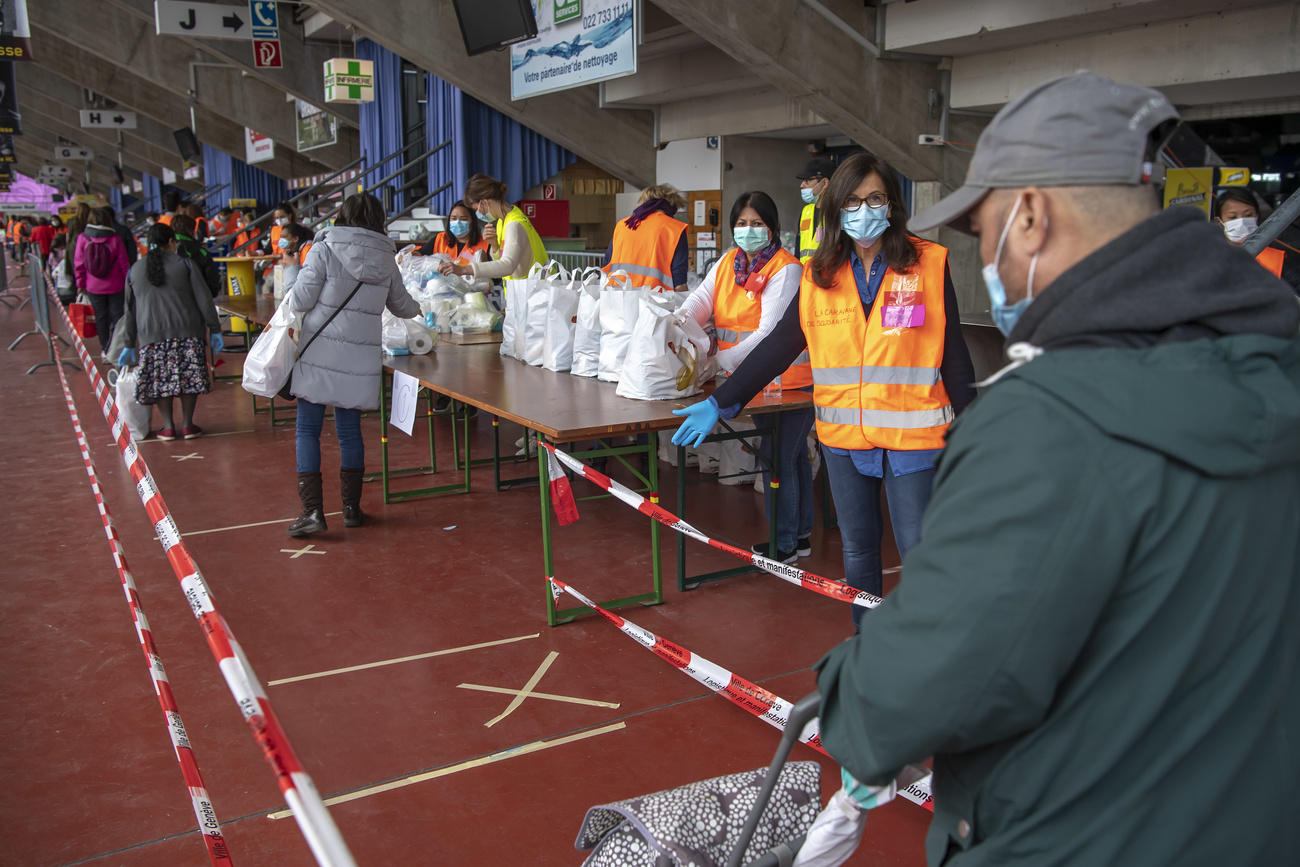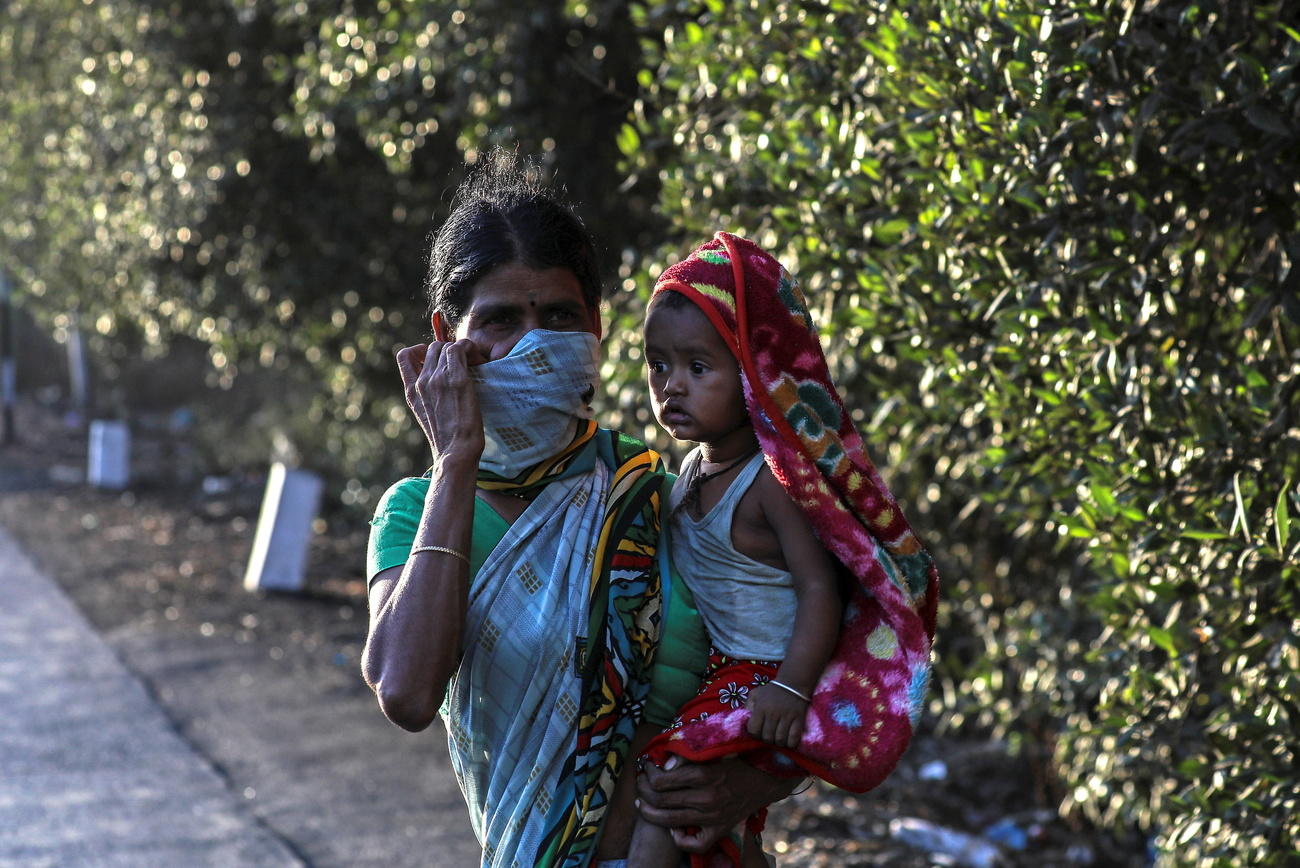Who’s at risk of poverty in Switzerland?

Almost 8% of the population was already living in poverty in Switzerland before the coronavirus crisis, and more than a million people were struggling to stay above the minimum subsistence level. The pandemic threatens to push many of them into precarious situations.
The images have caused such a stir that they have been published by major international media, including The GuardianExternal link, the New York TimesExternal link and Radio France InternationaleExternal link (RFI): over 1,500 people queued up last Saturday, stretching for over one kilometre, as they had done the previous week, to receive free food parcels worth CHF20 ($30) in one of the richest and most expensive cities in the world, Geneva.
Despite its wealth, canton Geneva has major socio-economic disparities. Since the beginning of the coronavirus crisis, the number of people requesting food support has quadrupled. The Covid-19 epidemic highlights the fragility of the poorest in Swiss society, who lost part or even all income sources overnight.
The medical charity Médecins Sans Frontières (MSF) and the University Hospitals of Geneva (HUG) conducted a surveyExternal link of the beneficiaries of this food distribution on May 2. Published on Monday, the results show that more than half of the participants have no legal status. However, the survey underlines that more than one-third of those present are eligible for social assistance (Swiss citizens, residents with a residence permit or asylum seekers).
Many of these people of diverse national origins work in domestic services such as childcare or housework, HUG doctor François Chappuis told Swiss public television RTSExternal link. These tenuous commitments have often been cancelled as a result of the semi-confinement measures in mid-March. Many of those affected are single mothers. Some of the participants are Swiss citizens.
The survey provides further evidence of the extreme fragility of the beneficiaries. In particular, we learn that six out of 10 respondents have no health coverage, and this share rises to almost nine out of 10 among undocumented migrants. More than 10% of the respondents have given up medical care in the last two months.
Vulnerable people pushed over the edge
Before the coronavirus crisis broke out, poverty and insecurity were already a reality for hundreds of thousands of people in Switzerland. According to figures published this year by the Federal Statistical Office (FSO), around 660,000 people (almost 8% of the population) endured poverty in 2018. More than a million people, or around one in seven, were at risk of falling below the poverty line.
There are more than 130,000 working poor in the country. Every fifth person lacks sufficient financial resources to meet an unexpected expense of CHF2,500.
Already vulnerable profiles, such as single-parent households, the chronically unemployed or undocumented migrants, now represent the majority of people who have turned to Caritas Switzerland since the beginning of the Covid-19 crisis. For the past two months, the association helping those on the margins of society has seen a sharp increase in the number of consultations. They have doubled or even tripled in some branches.
Strong impact on the self-employed
However, the semi-confinement measures have also weakened other categories of the population that are more socially and economically integrated. Wage cuts linked to short-time work, which has affected nearly two million employees, “can lead to a drop in wages if the pay was already low”, notes Caritas spokesperson Fabrice Boulé.
Another vulnerable profile is that of small independent entrepreneurs suddenly deprived of any income, who no longer have the financial reserves to survive. About 4,000 of them have had to appeal for transitional aid from Caritas, according to the organisation. The government has promised emergency help, but the long waiting period for this state support has forced them into debt.
One-third of Switzerland’s 600,000 self-employed people believe their very survival is at stake due to the coronavirus crisis, according to a survey conductedExternal link in April by the Centre for Economic Research at federal technology institute ETH Zurich and the Faculty of Business and Economics of the University of Lausanne.

In compliance with the JTI standards
More: SWI swissinfo.ch certified by the Journalism Trust Initiative





You can find an overview of ongoing debates with our journalists here. Please join us!
If you want to start a conversation about a topic raised in this article or want to report factual errors, email us at english@swissinfo.ch.